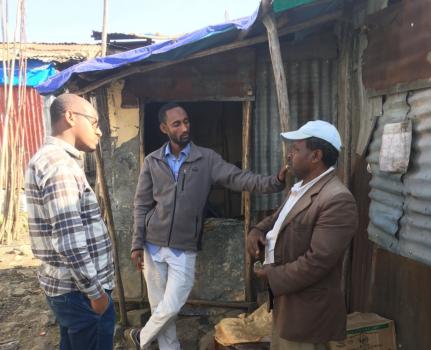Collaborative Solutions in Complex WASH Systems
The rapidly expanding town of Debre Birhan, Ethiopia, population 113,000, does not have a centralized sewer network. Some 66 percent of the town’s fecal sludge is now improperly managed (83 percent at baseline), leading to considerable land, water, and livestock contamination. When the U.S. Agency for International Development (USAID) Sustainable WASH Systems Learning Partnership (SWS) began its program in 2018, the town’s sanitation sector was highly disparate and uncoordinated.
For the past four years, SWS has been working in Ethiopia and other USAID priority countries to learn about and share the results of applied systems-based approaches to instill locally-led, sustainable water, sanitation, and hygiene (WASH) solutions in each context. Collective action is one type of collaborative, systems-focused approach that facilitates member trust and accountability through shared commitments and common objectives to solve long-term, complex social issues.
This blog summarizes how SWS partners facilitated collaboration and coordination between a dynamic network of WASH and non-WASH stakeholders in Debre Birhan to address its pressing sanitation issues, ending with a summary of achievements to date.
Collective Action in Process
The Debre Birhan Water Supply and Sewerage Enterprise and SWS partner Tetra Tech invited sanitation stakeholders to a consensus-building workshop in 2018 where they examined the evidence, identified shared problems, and plotted a path toward safer town sanitation. Attendees included representatives from utilities, municipal and kebele administration offices, the private sector, and communities. By the end of the workshop, the group prioritized the construction of a new fecal sludge dumping facility and the establishment of standard management practices for communal and public latrines. They also agreed to continue to meet quarterly as members of a “learning alliance.”
Learning alliances are local, multi-sectoral, volunteer coalitions of actors that regularly meet, plan, reflect, course-correct, and collaborate to address major social issues. The Debre Birhan learning alliance includes public officials in the sanitation, water, environment, health, and education sectors, in addition to donors, NGOs, journalists, and academics. This diverse representation facilitates broad insight into local system complexities and added incentives to implement sanitation solutions for all.
For a learning alliance to function effectively, someone needs to play the hub role — a central convener with local leverage and legitimacy to facilitate meetings, follow up on action items, and provide the learning alliance with logistical and administrative support (e.g., meeting space, clerical support, note-taking). Tetra Tech served as the hub under the guidance of IRC Ethiopia. Understanding the central role the town government plays in the change-making process, Tetra Tech quickly began training government members on leadership and learning alliance meeting facilitation. Three months later, the municipal deputy chair began adjourning and facilitating meetings with back-stop support from Tetra Tech.
The learning alliance has experienced setbacks. Political reforms in 2020 contributed to high member turnover. The COVID-19 pandemic forced authorities to temporarily halt program actions that same year. Starting in December 2020, regular meetings and follow-up actions began again, allowing Debre Birhan WASH decision-makers to move forward with the dumping facility and latrine management standards.
Results
The Debre Birhan learning alliance was highly influential in the town government’s decision to increase its annual sanitation budget by 68 percent in 2021 compared to 2020. The learning alliance’s biggest win, however, was to resolve the long-standing conflict regarding the new fecal sludge dumping facility location, securing land for one permanent site, and identifying land for a second. The learning alliance also helped usher in new mandates that include guidance on which entities (residential vs. industrial) are allowed to use the future facility.
Learning alliances will continue to focus on research and technical training for communal and public latrine maintenance and build consensus among stakeholders on fecal sludge management while SWS will transition learning alliance ownership to the Woliso and Debre Birhan governments.
Components of Success:
- Collective problem identification by stakeholders
- External funds for learning alliance activities
- Local government leadership and uptake of the learning alliance’s recommendations
Learn More
SWS recently hosted a webinar on its collaborative approaches in Ethiopia, Kenya, and Uganda, which previewed findings from a forthcoming cross-case comparative study and featured an informative Q&A with implementers and practitioners. The activity will be taking a deep dive into its more than four years of work on these approaches in two upcoming events: at Stockholm World Water Week, August 26, 2021, and during its online closeout event on September 29, 2021. More details on the closeout event will be coming soon and made available on Globalwaters.org/sws.
By: Shawn Peabody, SWS Lead Collective Action Researcher; Kimberly Pugel, SWS Collective Action Primary Researcher, and Erin Fiorini, Environmental Incentives Communications Associate


